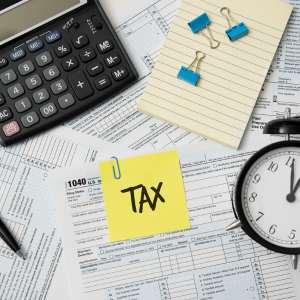
You need to know how selling your house will influence your taxes if you want to receive the maximum money for it in Cleveland, Ohio. When state tax regulations are different from federal capital gains laws, it might be challenging to know what to do. This guide goes over how Ohio handles capital gains tax, with a focus on Cleveland’s specific rates, exemptions, and filing requirements. If you’re getting ready to sell your house or have just finished a transaction, learning how taxes work might help you make smarter money decisions and maybe even keep more of your money.
Brief Overview
When you sell your house in Cleveland, knowing how capital gains taxes work might make a big difference in how much money you really get to keep. There is no state capital gains tax in Ohio; instead, the state follows federal tax standards. This makes things a little easier. But it’s still very important to plan, especially when it comes to figuring out the difference between short-term and long-term capital gains. Using federal exclusions, timing their sale well, and keeping track of any home improvements that qualify are all ways for homeowners to decrease their taxed earnings. If sellers know the rules and are ready, they can make the maximum money from their agreements.
Key Highlights
- Ohio doesn’t have its own capital gains tax; it follows federal legislation when it comes to selling property.
- For the sale of a primary residence, the federal government allows up to $250,000 for single filers and $500,000 for joint filers.
- Short-term vs. long-term gains matter: You pay less in taxes if you hold a sale for more than a year.
- Planning pays off: If you raise your cost base and time your sale effectively, you’ll pay less in taxes.
- It is best to receive advice from a professional. A tax expert can help you get the most out of your benefits while still following the rules.
What you should know about taxes and capital gains in Ohio
When you sell your house in Cleveland, the idea of capital gains is what decides how much tax you have to pay on the sale. You have capital gains when you sell something, like a house, for more than you paid for it after making some adjustments. You need to know how this profit is taxed and what the difference is between short-term and long-term gains in order to make good financial decisions. Using the appropriate strategies will help you pay off your debts and make sure your house sale goes as easily and profitably as feasible. To get the most money out of your real estate, you need to know how federal rules affect Ohio’s tax system.
How much tax do you have to pay on capital gains?

You have to pay capital gains tax on any profit you make when you sell something, such a house. The difference between the price you paid for the property (plus certain renovations, called your “cost basis”) and the price you sold it for is what it is. You might have to pay more taxes if you make more money.
You need to know if your gain is short-term or long-term. If you sold the property after holding it for less than a year, the profit is a short-term gain and is taxed like normal income, usually at higher rates. If you hold a property for more than a year, you can pay less tax on the money you make from it. This can change a lot in how much you owe.
This disparity matters to folks who own properties in Cleveland, and understanding Taxes When Selling an Inherited Home becomes essential. The rules are determined by the federal government, and Ohio follows them. You can make better decisions if you know how both systems work. When tax season comes around, you won’t be startled if you know how capital gains tax works, whether you’re planning to sell soon or just looking at your options.
Short-Term vs. Long-Term Gains
How long you’ve owned your property has a huge impact on how much tax you pay on your profits. If you sell within a year of buying, your profits are short-term and taxed at the same rate as your regular income. A lot of these rates are high for some taxpayers, which is why a lot of individuals choose to hold a property for longer before selling it.
If you sell your Cleveland home after owning it for more than a year, the profit you earn is considered a long-term capital gain, which is taxed at a lower rate. This can help you save a substantial amount of money. For homeowners, patience often pays off—literally. Holding your property long enough to qualify for long-term status can have a significant impact on your bottom line.
Strategic timing also allows sellers to plan their sale during a year when their income and overall tax rate are lower. In short, understanding how timing affects your capital gains taxes can make a major difference in your financial outcome.
If you’re thinking about selling, remember that we buy houses in Cleveland and understand the importance of smart timing and tax planning when it comes to maximizing your profits.
Information about Ohio’s capital gains tax
The capital gains tax system in Ohio is rather easy because it is fairly comparable to the federal system. Because the state doesn’t have its own capital gains tax, homeowners have it easier. But you still need to pay close attention to what the federal government wants. If you know how the two systems function together, you may make sensible choices that decrease your tax payment when you sell your property.
How much is the capital gains tax in Ohio?
Ohio doesn’t have a separate state-level capital gains tax because it follows federal tax rules. But this doesn’t mean you won’t have to pay taxes. If you own a home for less than a year, you have to pay taxes on short-term capital gains at your ordinary income rate, which is depending on how much money you make in a year. On the other hand, long-term gains are taxed at lower federal rates that change based on how much money you make.
You could also be able to secure federal exclusions that lessen or get rid of your taxable gains. If you sold your main home and lived there for at least two of the last five years, you can leave out up to $250,000 of the gain. You can leave out up to $500,000 if you file as a couple. This exclusion might completely cover the taxes that many homeowners have to pay, making it far better to sell their main property.
Is there a tax on capital gains in Ohio?

To put it simply, Ohio does not have a separate tax on capital gains. The state follows all of the federal tax rules, so the only taxes you have to pay on the money you make from selling your house are federal ones. This makes it easier to do taxes, but homeowners still need to grasp how federal deductions and exclusions operate.
Retailers in Cleveland, for instance, can use the federal exclusion to avoid paying taxes on a large portion of their profits, and in certain cases, all of them. Married couples can leave out up to $500,000, and single homeowners can leave out up to $250,000, as long as the property was their principal home and they met the standards for ownership and occupation.
Ohio doesn’t have a separate state tax, but it’s still important to grasp how all of the state’s taxes function. Changes at the county level and property taxes in your area could still affect your entire financial picture. If you want to get the most out of your deal while still following the regulations, see a lawyer who knows both federal and Ohio law. Things Ohio homeowners should keep in mind.
Here are some things to keep in mind if you want to get the most money when you sell your home in Cleveland:
- Find out if you can get the federal principal residence exclusion.
- Learn how Ohio’s tax rules are like those of the federal government.
- Look into any local tax breaks that could aid your business.
- Plan your sale so that you may earn the highest exclusion, which is either $250,000 or $500,000, depending on how you file your taxes.
- Keep detailed records of who owns and lives in the property to meet IRS criteria.
- For tailored counsel, talk to a tax professional who has been doing this for a long time.
- These tips will help you navigate Ohio’s real estate taxes more smoothly and even make you some additional money.
How to Deal with Capital Gains Taxes
When you sell property in Cleveland, you can lower your capital gains tax bill by a lot with smart planning. You may cut your taxes and make more money in a lot of ways, like improving the cost basis of your house and timing your sale well. Let’s find out how.
How to Pay Less in Ohio Capital Gains Taxes
The quickest and easiest way to lower your taxable gains is to boost your cost basis, which is the total amount you’ve spent on your house. This includes the price you paid for the house and the cost of major upgrades like new roofs, kitchen remodels, or changes that conserve energy. Understanding what you can write off when you sell your house makes it vitally crucial to keep track of these charges and keep receipts. If you paid more for anything, you have less taxed gain.
After that, use the federal home sale exception. If your Cleveland residence was your main home for two of the last five years, you can leave out up to $250,000 in profits (or $500,000 for joint filers). This exclusion is one of the finest ways for homeowners to cut their taxes, and it can sometimes get rid of the tax burden completely.
The timing is also very critical. If you maintain the property for more than a year, your short-term gains turn into long-term gains, which are taxed at lower rates. Some sellers even arrange to sell their properties in a year when they make less money, which cuts the tax rate on their earnings even more.
Finally, you might want to look into doing a 1031 exchange with some of your investment properties. You still have to pay taxes, but you can put off paying them by using the money from the sale to buy another property that is similar. This can be a really good technique for investors who wish to grow their money.
How to Get Ready for Taxes When You Sell Your Ohio Home

You should get ready for your taxes long before you put your house up for sale. Before selling their homes, Cleveland residents should consider how it would affect their overall income and what deductions they might be able to take. This step is quite important for people who make a lot of money, so they don’t suddenly find themselves in a higher tax bracket.
If you own the home as an investment, you might be able to put off paying taxes by using tools like a 1031 exchange. This option doesn’t work for those who live in their homes, but it is helpful for people who are selling rental or commercial property.
Another item to think about is how long you’ve owned the property. If you hold your property for at least a year, as we indicated earlier, your profit will be a long-term gain, which is taxed at a much lower rate. Make sure that what you sell fits in with your larger financial goals. This will help you keep track of your money better.
Finally, remember that when you sell your house fast in Ohio, you may be able to deduct certain repair and selling expenses. Costs like agent commissions, legal fees, staging, and home repairs can often be partially deductible, helping to lower your overall taxable gain. To make sure you take advantage of every available benefit, it’s wise to work closely with a tax professional who understands Ohio’s specific tax laws and real estate regulations.
How to Find Out Your Capital Gains Tax
It could seem hard to figure out how much capital gains tax you owe, but it’s not that hard if you break it down. First, find out your cost base, which is the price you paid for your Cleveland home plus the cost of any substantial repairs. To figure out your profit, subtract that number from the sale price.
If your home qualifies, you can also take away the federal exclusion. For example, a married couple who sells their principal house might not have to pay taxes on up to $500,000 in gains. If you sell your house and have any money left over, you’ll have to pay capital gains tax on it. The amount of tax will depend on how long you have owned the house.
Short-term gains are taxed like regular income, but long-term gains are taxed at reduced federal rates. The actual rate depends on how much money you make. If you’re selling an investment property, you might also want to check into deferral strategies like a 1031 exchange, which lets you acquire the same property and put off paying taxes.
Keeping detailed records and consulting with a tax professional will help you make sure your calculations are correct and that you are following both state and federal rules.
In Conclusion
Understanding how capital gains tax works is essential if you want to keep more of your profit when selling your house in Cleveland. While Ohio doesn’t have its own capital gains tax, federal rules still apply — and they can be tricky to navigate. By using the right exclusions, timing your sale strategically, and working with experienced professionals, you can reduce your tax burden and maximize your return.
Selling your home is a big financial and personal decision. Cleveland homeowners who plan ahead and understand the tax laws can protect more of their hard-earned money and move forward with confidence.
Cleveland House Buyers buys houses for cash in any condition — reach out today to see how we can help you sell fast and hassle-free.
FAQs
How much do you have to pay in capital gains taxes when you sell a house in Cleveland, Ohio?
You have to pay capital gains taxes if you sell your house for more than you paid for it (after making changes). These taxes in Ohio follow federal rules, which means they treat short-term and long-term gains differently.
Are there any exclusions for homes that are your main residence?
Yes. You can leave out up to $250,000 of gains ($500,000 for joint filers) if you have lived in the home for at least two of the last five years.
What steps can I take to lower my capital gains taxes?
To raise the cost basis of your property, make renovations to it, retain it for long enough to qualify for long-term rates, and take full advantage of the federal primary residence exception.
Is there a tax on capital gains in Ohio?
Ohio does not do that. It follows the standards for federal taxes, which makes it easy to figure out how much money you made and report it.
What is the difference between short-term and long-term profits?
The tax rate on short-term gains is usually higher than the tax rate on long-term gains. If you time your investments well, you might be able to pay less in taxes overall because long-term earnings are taxed at lower rates.
Helpful Cleveland Blog Articles
- Refinancing Your Cleveland, OH, Home After Divorce
- Inheriting A Mortgaged House In Cleveland, OH
- Average Cost To Sell A House in Cleveland, OH
- How To Sell A House with Flood Damage in Cleveland, OH
- How To Sell An Investment Property in Cleveland, OH
- Capital Gains Tax After Selling A House in Cleveland, OH
- Selling A Home That Needs Repairs in Cleveland, OH
- Selling Your House To A Relocation Company in Cleveland, OH
- Selling a House with Solar Panels in Cleveland, OH
- Taxes When Selling an Inherited Home in Cleveland, OH

